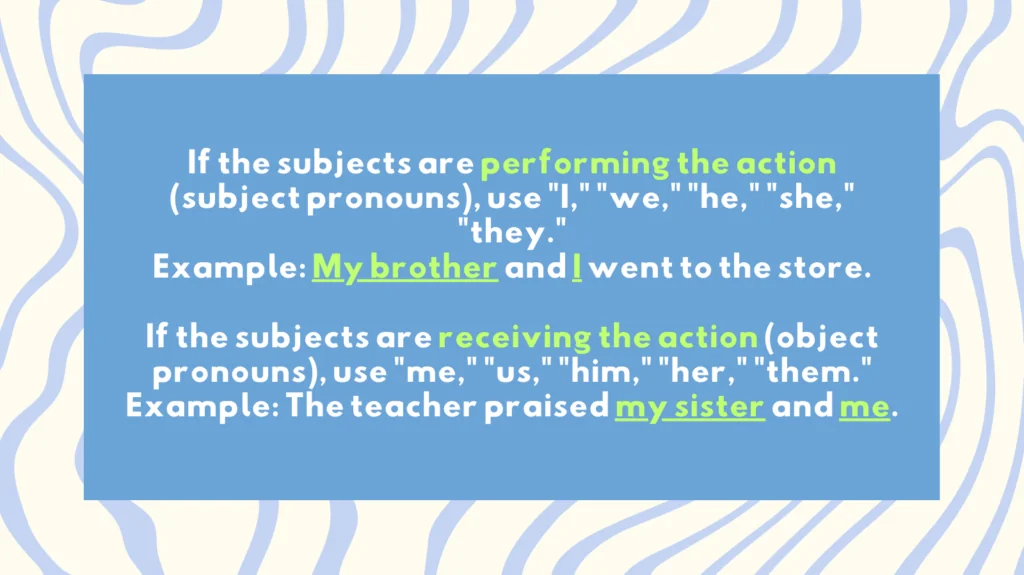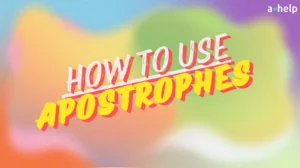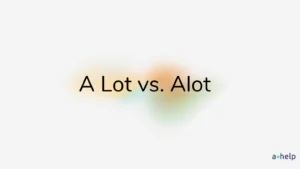One common confusion in English grammar check is when to use “me” and when to use “I.” Both are pronouns, but they serve different roles in sentences. “I” is a subject pronoun, used when the pronoun is the subject of the sentence, doing the action. “Me” is an object pronoun, used when the pronoun is the object of the sentence, receiving the action. In the example, “I went to the store” you are doing the action, and in the sentence “She gave me a gift”, you are receiving the action.

✅ AI Essay Writer ✅ AI Detector ✅ Plagchecker ✅ Paraphraser
✅ Summarizer ✅ Citation Generator
The Difference Between Me and I
“Me” and “I” are both pronouns used to refer to oneself, but they serve different roles in sentences. The main difference lies in their usage: “I” is a subject pronoun, used when the pronoun is the subject of the sentence and performs the action. In contrast, “me” is an object pronoun, used when the pronoun is the object of the sentence and receives the action.
“My friend and I went to the store, and she bought me a snack.”
In this sentence, “I” is used as the subject pronoun because it is part of the subject “My friend and I.” “Me” is used as the object pronoun because it is the object of the verb “bought.”
“The teacher praised me for my work, but I need to improve.”
Here, “me” is the object pronoun receiving the action of being praised. “I” is the subject pronoun performing the action of needing to improve.
When to Use “Me” and “I”
In English, deciding between “me” and “I” can be tricky, but there are clear rules to help you choose the right pronoun.
When to Use “I”: Use “I” when the pronoun is the subject of the sentence, meaning it’s the one doing the action. For example:
- “I went to the store.”
- “My sister and I are going to the concert.”
When to Use “Me”: Use “me” when the pronoun is the object of the sentence, meaning it’s receiving the action. There are two types of objects where “me” can be used:
Direct Object: This is the noun or pronoun directly affected by the action of the verb.
- The teacher called me.
In this sentence, “me” is the direct object because it’s directly receiving the action of being called.
Indirect Object: This is the noun or pronoun that indirectly receives the action, usually indicating to whom or for whom the action is done.
- She gave me a gift.
Here, “me” is the indirect object because it’s indirectly receiving the action of giving; the gift is the direct object.
Which Should You Choose When There Is More Than One Subject?
When there are multiple subjects in a sentence, choosing the right pronoun can be confusing. But we got you! Here are some rules and tips to help you make the correct choice.

One way to know for sure is to remove the other subject to decide whether to use “me” or “I”. For example, in the sentence “My friend and I went to the store,” if you remove “My friend and,” the sentence still makes sense: “I went to the store.” Similarly, in “She gave my friend and me a gift,” if you remove “my friend and,” the sentence remains correct: “She gave me a gift.” This easy test can help you choose the right pronoun and avoid confusion.
Another option is to match the pronoun to the verb. If the verb is something the subjects are doing, use a subject pronoun. If the verb is something being done to the subjects, use an object pronoun.
Finally, you should always consider the position of the word. If the pronoun comes before the verb, it’s likely a subject pronoun. If it comes after the verb or a preposition, it’s likely an object pronoun.
FAQ
Follow us on Reddit for more insights and updates.





Comments (0)
Welcome to A*Help comments!
We’re all about debate and discussion at A*Help.
We value the diverse opinions of users, so you may find points of view that you don’t agree with. And that’s cool. However, there are certain things we’re not OK with: attempts to manipulate our data in any way, for example, or the posting of discriminative, offensive, hateful, or disparaging material.